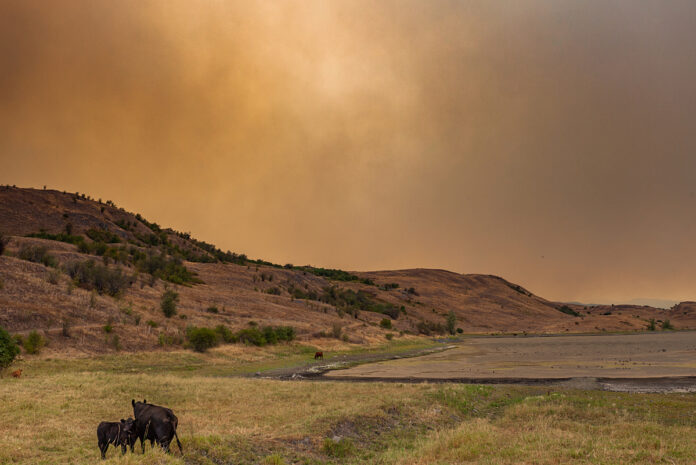
A Mercer University faculty member will continue to raise awareness of animal agriculture’s environmental impact through a grant-funded research project. Dr. Vasile T. Stănescu, associate professor in the Department of Communication Studies and Theatre, was recently awarded a $17,000 seed grant from the Climate Social Science Network, housed at Brown University.
Dr. Stănescu’s academic background is in rhetoric, which is the study of written, spoken and visual communication and how it is used to inform, influence or persuade the public. His research often explores discourse related to the environment, health, animals and animal agriculture.
One of his main focus areas is greenwashing — when companies or organizations make false or misleading claims about their environmental responsibility — by the animal agribusiness industry. Animal agriculture is the second-largest contributor to greenhouse gas emissions, behind the fossil fuels used for electricity and transportation, he said.

A chapter titled “‘Cowgate:’ Meat Eating and Climate Change Denial” that Dr. Stănescu wrote for the 2019 book Climate Change Denial and Public Relations shed light on the growing trend of animal agriculture groups to downplay or distort scientific facts related to the industry’s contributions to pollution and climate change. His chapter inspired additional research, investigations and publications on the topic by other professors, organizations and agencies.
“The significant contribution of animal agriculture and its impacts on land use change and direct emissions to the parallel climate and biodiversity crises is irrefutable,” said Dr. Richard Twine, co-director of the Centre for Human-Animal Studies and professor at Edge Hill University in England and author of the 2024 book, The Climate Crisis and Other Animals. “For 20 years, Vasile Stănescu has been one of the main U.S.-based critical voices in bringing this to our attention.”
Researchers from all over the world are working on issues related to climate change with the Climate Social Science Network, and Dr. Stănescu is a member of the organization’s focus group on animal agriculture. Until now, he has primarily studied the greenwashing of animal agriculture in the United States, but he has recently turned his focus to Canada.
“Why Canada? Canada as a country actually believes in climate change even more than the United States,” Dr. Stănescu said. “So they have a lot of funding from the government to try to help animal agriculture become more sustainable. But the problem is that the industry often is taking this money not to make it actually more sustainable but just to do greenwashing that’s actually being funded by the government.”
Dr. Stănescu is almost finished with a peer-reviewed article focusing on Canadian mentorship programs in which new Ph.D. graduates conducting sustainability research are mentored by people who run large factory farms in Canada. The Climate Social Science Network grant will support a second article that will focus on endowed professorships at state universities that are paid for by animal agriculture companies. Dr. Stănescu said both situations present conflicts of interest and raise concerns about objective research.
“The project analyzes how these industry-funded academics promote misleading narratives about beef and climate change through public channels such as media interviews, podcasts and outreach to policymakers. The research uncovers how animal agriculture distorts climate discourse to resist regulation,” according to Dr. Stănescu’s abstract for the project. “The findings will contribute to understanding the intersection of industry influence, academic bias and climate communication.”
The grant will allow Dr. Stănescu to hire one or two student researchers to assist him with the project during the 2025-26 academic year. The students will gather information for a large database that will be built with information on Canadian animal agriculture organizations and companies, including the Canadian Beef Cattle Research Council, believed to be engaging in greenwashing.
The researchers will catalog social media posts, podcasts, interviews and other instances where Canadian animal agriculture organizations and companies have talked about their peer-reviewed studies. The problem is that there are no parameters or recourse to what these parties say or how they present their research, which can result in misinformation and misunderstanding by the public, Dr. Stănescu said.
“I believe this grant highlights the exceptional educational opportunities Mercer provides to every student,” he said. “It’s uncommon for undergraduates to engage in nationally funded research addressing the most pressing challenges of our time — such as climate change. Yet, at Mercer, we offer every student precisely this opportunity.”
Real, sustainable changes are needed from the animal agriculture industry to help combat climate change, Dr. Stănescu said. He hopes his research and projects by his colleagues can help push the industry in the right direction and emphasize the importance of true academic integrity and separation from monetary influence in animal agriculture research.
“Dr. Stănescu’s new research project turns his revealing critical gaze to the Canadian meat industry,” said Dr. T. McDonald, graduate chair of history at McMaster University in Canada. “In ‘Cowgate,’ he revealed the connections between meat industry funding of scholars in the United States whose work in turn is immediately picked up by the media to challenge the reality of the massive role animal agriculture plays in climate change. His new focus is the Canadian Beef Cattle Research Council and its role in funding endowed chairs at Canadian universities. Dr. Stănescu shows how these scholars in turn downplay the damaging impact of the meat industry in Canada in their public facing statements.”
Efforts to reduce the methane produced from animal agriculture could have a significant impact in decreasing global warming in a shorter period of time, since methane doesn’t stay in the environment as long as carbon emissions. Dr. Stănescu said this could provide a window for bigger structural changes.
“Climate change is real. It’s happening. We’re living through it,” he said. “There is research that shows it will be impossible to meet the Paris Agreement (an international treaty on climate change) or prevent the 1.5- or the 2-point degree change in warming if we don’t deal with animal agriculture. So we have to focus on it, and we have to make real changes in the time we have.”









